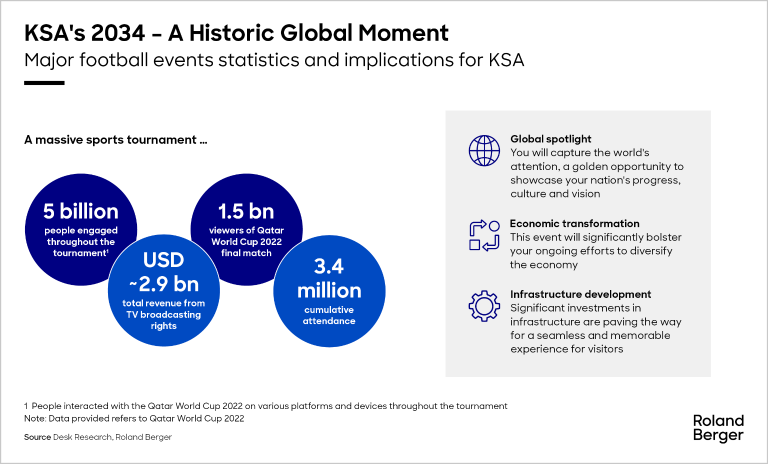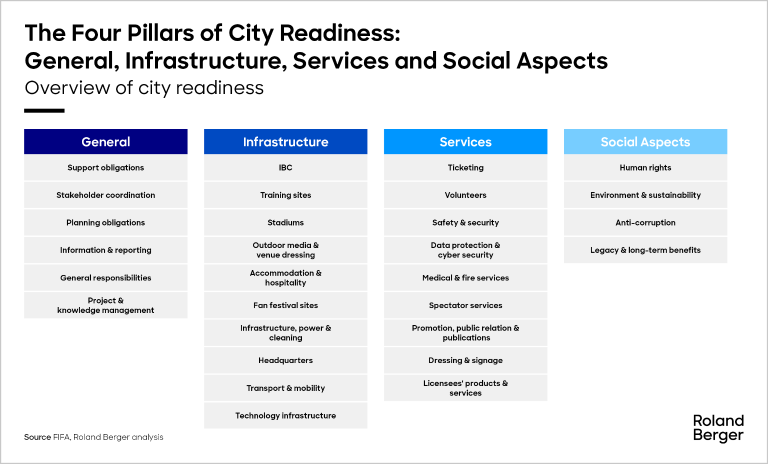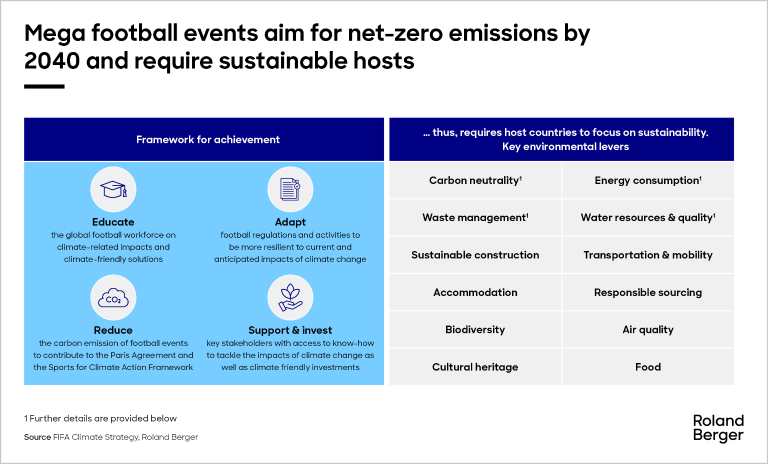Tailored solutions for sports sector growth.


Preparing cities for the mega football events
A Blueprint for global sporting success
Hosting a mega football event is a defining moment for any city, requiring meticulous planning and coordination across multiple dimensions. It is a chance for cities to showcase their ability to deliver excellence in sports and community engagement, infrastructure, sustainability, and economic development.
This article, the first in a series, examines the foundational elements of city readiness. It introduces a strategic framework designed to align and integrate key components, ensuring seamless planning and execution. Drawing on insights from previous large-scale global events, it highlights how cities can successfully address the needs of diverse stakeholders while achieving their broader objectives.

Saudi Arabia mega football event 2034
Hosting a global event is a defining opportunity for any city. The 2022 Qatar World Cup, which reached over 5 billion people worldwide and attracted 3.4 million attendees, illustrates the vast scale and impact of such an event. Cities must be prepared to handle this level of engagement, ensuring smooth operations.
The tournament transcends the games themselves, symbolizing a nation’s vision, values, and aspirations. For Saudi Arabia, 2034 is more than just a sporting event, it reflects the Kingdom’s bold vision for the future.
The multidimensional nature of city readiness
Hosting a mega football event requires extensive planning and coordination across various sectors. Roland Berger has developed a framework for host cities, categorizing their responsibilities into four main sections. Each category includes a range of duties that ensure a seamless and successful sporting event.
- General Considerations: Ensuring public safety, seamless transportation, and cultural integration for a diverse influx of visitors.
- Infrastructure Development: Constructing and upgrading world-class stadiums, transportation networks, and accommodation facilities to meet international standards.
- Services and Operational Excellence: Streamlining event operations, from security and healthcare to spectator services and volunteer management.
- Social and Sustainability Factors: Creating a lasting legacy that benefits local communities and aligns with global sustainability goals.
Roland Berger leverages its insights and experience to implement key environmental levers that go beyond meeting sustainability goals in event planning and execution.
Focus on environment & sustainability
In line with FIFA’s ambitious goal of achieving net-zero emissions by 2040, Saudi Arabia’s World Cup plans must emphasize sustainability and climate action. This includes but is not limited to, adopting innovative environmental strategies to reduce energy consumption, manage waste effectively, optimize water usage, and promote renewable energy sources.
"Cities should view mega events as catalysts, emphasizing innovation, infrastructure, and a lasting impact."
Energy consumption is a key focus area, requiring measures that ensure energy security, increase reliance on renewable energy, and enhance overall efficiency. Smart meters and energy management systems can monitor and control consumption in real time, while automated lighting and the replacement of traditional lighting with LEDs will reduce energy usage significantly. Smart HVAC controls can further optimize air conditioning and ventilation, making stadiums and facilities more efficient. On the renewable energy front, installing solar panels and using battery storage systems can harness and manage the region’s abundant sunlight. Innovative solutions, such as piezoelectric materials in stadium flooring, can convert kinetic energy from movement into electricity, demonstrating cutting-edge sustainability practices.
Effective waste management is another critical component. Saudi Arabia can minimize environmental impact by banning single-use plastics and disposable items, offering water refill stations, and adopting digital, paperless ticketing systems. Clearly labeled waste segregation bins can encourage recycling, while food waste composting stations can divert organic waste from landfills. These measures can set a new benchmark for waste management at global events.
Water conservation and quality enhancement are equally vital. Sensor-activated and low-flow faucets and toilets can significantly reduce water waste, while leak detection systems and IoT-enabled water sensors can identify inefficiencies. Smart water monitoring systems can optimize usage and improve treatment processes, ensuring sustainable water resource management during and beyond the event.
Sustainability must also extend to construction practices and transportation solutions. Using low-carbon concrete and incorporating reclaimed and recycled materials in infrastructure projects can reduce the environmental footprint. Glass-Reinforced Fiber Plastic (GRFP) materials can be utilized in roofing, facades, and seating to enhance efficiency, while modular construction methods can streamline building processes and minimize waste. Green roofing and landscaping can provide natural insulation and support biodiversity. For transportation, deploying electric buses and shuttle services, promoting ride-sharing, and providing incentives for electric vehicles, such as charging stations and free parking, can significantly lower emissions. Electric bikes and scooters can also offer eco-friendly alternatives for short-distance travel.
A Blueprint for the future
The logistical and operational demands of hosting a mega football event are immense, encompassing far more than the matches themselves. From infrastructure development to community engagement and sustainability, each element plays a vital role in delivering a successful tournament. For Saudi Arabia, the World Cup is a transformative opportunity to redefine global perceptions, celebrate its rich heritage, and position itself as a leader in holding mega events and creating a lasting legacy for future generations.
At Roland Berger, we provide robust support to our clients involved in hosting and organizing large-scale events, focusing on several key areas to ensure operational success and strategic excellence:
- Strategic planning and feasibility studies: Our team assists clients in strategic planning on bid preparation and meeting the requirements for infrastructure and sustainability. This includes assessing the feasibility of hosting events, conducting economic impact assessments, and cost-benefit analyses.
- Project management and implementation: Roland Berger provides guidance in managing large-scale sporting events, ensuring compliance with the federations' operational, accommodation, and transportation standards. We coordinate with local governments, construction firms, and service providers.
- Sustainability and environmental compliance: Our team assists clients in incorporating the federation’s sustainability requirements into event planning and operations, focusing on carbon neutrality, waste management, and sustainable infrastructure to enhance the event’s legacy.
- Economic and social impact: Roland Berger provides insights on maximizing the economic and social benefits of hosting the World Cup through community engagement, supporting local businesses, and promoting long-term tourism growth.
- Risk management and security: offering strategic advice on risk assessment and crisis management, focusing on comprehensive safety measures, including cybersecurity and physical venue security.
- Technology and innovation: Roland Berger advises on integrating cutting-edge technology for event operations, including ticketing systems and fan engagement platforms, to enhance the experience for attendees and viewers worldwide.
By partnering with Roland Berger, clients gain access to a blend of strategic insights, practical planning tools, and innovative solutions tailored to meet the challenges of hosting world-class sporting events, ensuring they not only meet but exceed the expectations set forth by organizers and all stakeholders involved.









